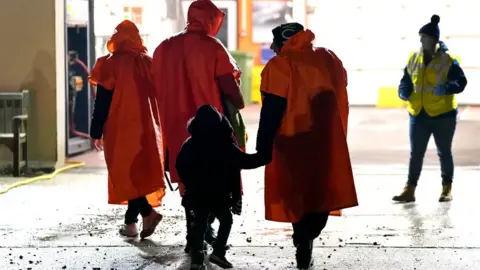Fair for asylum seekers to share hotel rooms, says Robert Jenrick
The UK has to "reduce its reliance on hotels" for housing asylum seekers, immigration minister Robert Jenrick has said.
Speaking to the BBC, he said he had to look after taxpayers and his duty was to the British public over migrants.
He added it was "fair and reasonable" to ask asylum seekers to share rooms in hotels in some circumstances.
It follows a dispute with asylum seekers over their temporary accommodation in central London.
Last week, about 40 asylum seekers were offered space in a Pimlico hotel, but refused to enter after being asked to sleep four people per room.
Head of Westminster Council Adam Huq expressed his concern in a letter to the home secretary, saying people who "are likely to have been through significant and traumatic events" were being asked to share "an inappropriately sized room with multiple strangers".
Asked about the case on the BBC's Sunday with Laura Kuenssberg programme, Mr Jenrick said the government did not want to use hotels, arguing it was "taking away valuable assets for the local business community... people's weddings and personal events have had to be cancelled".
"But where we are using them, it's right that we get good value for money for the taxpayer," he added.
"And so if single adult males can share a room, and it's legal to do so, which will obviously depend on the size of the accommodation, then we'll ask people to do that," he added.
However, he denied it was government policy for asylum seekers and migrants to be housed in shared rooms.
He also suggested people were making illegitimate asylum claims, telling the BBC's Sunday with Laura Kuenssberg programme that the UK's system was "riddled with abuse". The country could not be allowed to be "perceived as a soft touch", he added.
Labour said in response: "After 13 years of Tory failure, the asylum system isn't just broken - it's costing tax payers a fortune - only Labour has a proper plan to stop dangerous boat crossings."
Prime Minister Rishi Sunak has made reducing the numbers coming to the UK illegally one of his key priorities. Part of his plan is to implement the Illegal Migration Bill, currently going through Parliament.
It would give ministers new powers to remove anyone arriving in the UK illegally and stop them claiming asylum here.
But it has attracted fierce criticism including from the Archbishop of Canterbury, who said it risked "great damage" to the UK's reputation.
The BBC understands the Home Office estimates the plans in the bill could cost between £3bn and £6bn through spending on detention facilities, as well as ongoing accommodation and removals.
Last year the number of people arriving in the UK in small boats via the English Channel hit over 45,000 - the highest number since figures were first collected in 2018. So far this year, 7,610 people have made the crossing, a fall of more than 2,000 compared with the same time last year.
The number of people claiming asylum has also risen with figures in 2022 hitting a near 20-year high of 74,751.
The government has a legal obligation to provide asylum seekers - who are not allowed to work while their claim is being processed - with a basic level of accommodation.
Asylum seekers would typically only be housed in hotels or hostels for a few weeks, before being moved to long-term self-catered homes.
However the increase in people claiming asylum -and the backlog of unprocessed claims - has led to a growth in the use of hotels to provide temporary accommodation.
Government sources have previously told the BBC it is using 395 hotels to home more than 51,000 asylum seekers.
The use of hotels has proved to be expensive, costing almost £7m a day. It has also prompted anger among many Conservative MPs, who say the plan puts a strain on local amenities.
 PA Media
PA MediaMinisters are trying different ways to accommodate the rising numbers of people who are coming to the UK, including housing people in barges or facilities on air bases.
Mr Jenrick was keen to repeat his assertion that the government was taking a robust approach, and that by asking migrants to share rooms he wanted to cut the costs to the taxpayer.
But he was less keen to acknowledge that the backlog for asylum claims is extremely high, and that compared to a few years ago, it takes much longer for cases to be resolved.
The problems with accommodation at the hundreds of hotels around the country would be far less acute if there were fewer people stuck in the system.
When it comes to how ministers handle the issues, there are not many easy answers.
But while Conservative ministers say they want to bring immigration down, they have presided over the numbers going up and up. There is a serious clash between the rhetoric and the reality.
In addition to illegal migration, there has also been an increase in people coming to the UK legally - the most recent figures saw net migration rise by 606,000.
In 2010, the Conservatives promised to reduce net migration to below 100,000.
Asked if that number was still realistic, Mr Jenrick said he didn't think targets were "particularly helpful" because "behaviours are constantly changing".
